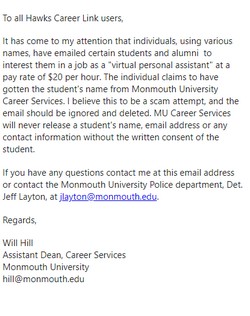Patrick D. Murray, Director of The Polling Institute at Monmouth University, appeared on the FiveThirtyEight Politics podcast to discuss his opinion about putting an end to horse-race polling on Monday, Nov. 15.
Murray’s appearance on the podcast came following an article he wrote for NJ.com titled “‘I Blew It.’ Maybe It’s Time To Get Rid Of Election Polls,” in which he discussed significant miscalculations from the A-rated Monmouth Poll in the New Jersey governor’s race and other recent elections.
When asked about his thinking behind getting rid of election polling, Murray revealed that this wasn’t a sudden realization –– he’s been questioning its worth for some time now.
“With the horse race question itself, there is more and more uncertainty about how valuable it is. We had two races this year that people were paying attention to: the Virginia governor’s race and the New Jersey governor’s race. The Virginia polling was pretty good, including my own poll. So why did the New Jersey race set me off? I think it was kind of the final straw,” said Murray.
“I’m starting to come to the conclusion that there are some times when your samples are just going to be off,” continued Murray. “Are we doing a service to ourselves by putting out information that we know has less reliability than some of the other information we put out?”
Murray asserted that there is more uncertainty surrounding horse race polling than issue polling. He pointed to the fundamental role of polling, which he described as taking a “snapshot” of what the current public looks like.
“The first rule of that is you have to know who the public is,” explained Murray. “In the horse race, we’re doing something that polling isn’t really designed to do. We’re trying to predict what the public is going to look like, that public being the people who actually vote.”
Murray described his fear that the horse race question has the potential to change the narrative of polling results: “If I looked at my New Jersey polling and I did not ask the horse race question but asked every other question –– the issue question, the candidate questions, the relative strengths of the candidates on those issues –– that probably would have told a different narrative.”
“My concern is much more philosophical than it is about the statistical backing of polling,” said Murray. “We live in a world where facts are under attack. I am looking at the contribution polling makes to countering this problem that we’ve been facing.”
Murray noted that he is primarily concerned about “the people in the middle of the population who are losing faith in public institutions and public processes” as a result of inaccurate narratives created by horse race polling.
“Are we contributing to this every time we put out a horse race poll?” questioned Murray. “Even though they’re right most of the time, is it amplifying this problem when they’re wrong?”
Murray also pointed to issues with media coverage of poll results, which frequently glosses over the issue questions and instead focuses on the horse race and the cash race. He emphasized the importance of giving more attention to issue questions, especially in the context of an election. If pollsters stop asking horse race questions, Murray hopes that this will force the media to report results “the right way” to create a more accurate narrative.
Conversely, Murray acknowledged that institutional pollsters discontinuing horse race polling won’t prevent it from happening altogether. Rather, he emphasized his personal dilemma about conducting such polling: “As an American, my responsibility is where is this country going right now and what is my contribution to that?”
“As a pollster and a survey researcher and someone who is deeply concerned with political behavior and our political culture, I have to think about where I can best make that contribution, so I put a stake in the ground around horse race polling and the value of it,” he continued.
Murray suggested other potential solutions that could avoid generating public mistrust without doing away with horse race polling. He recommended not reporting the midpoint average, instead focusing on the range to show the bounds rather than reporting a single number in the middle.
Murray also proposed that pollsters can continue to ask the horse race question but change how they report the results, ideally avoiding the margin. “I’m open to looking for another way to produce those results that is not only accurate for polling purposes, but also increases public confidence that what we’re reporting is in the realm of reality,” he said.
When asked if he was going to stop horse race polling at Monmouth, Murray responded “I am fairly certain that I am going to stop reporting the horse race number the same way that we’ve been reporting it in terms of candidate X versus candidate Y and the margin between them.”
“I just don’t think horse race polling serves what my mission is, what the mission of the Monmouth University Polling Institute is,” said Murray. “You’re not going to see that same question from us reported in the same way.”


